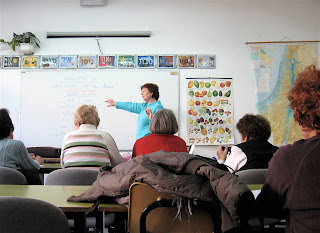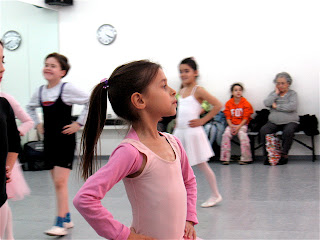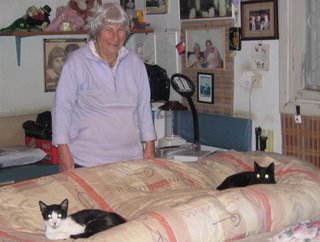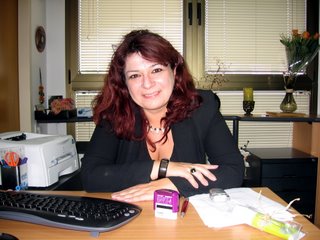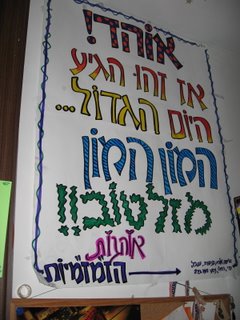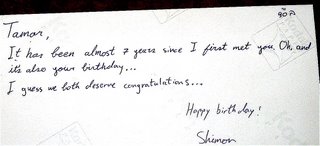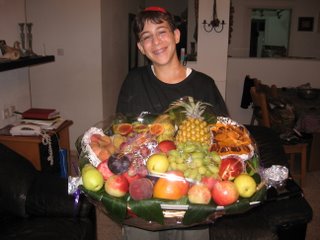 |
Daniel Zohar, דניאל זוהר, 14
|
NOTE: Meet guest blogger, Daniel Zohar, a ninth grader at Himmelfarb Boys’ High School in Jerusalem. My fascinating and loving second cousin with wide-ranging talents and a knockout smile is passionate about three subjects — music, art, and literature. On my recent visit with his family last Shabbat and Simchat Torah, Daniel and I read and discussed his powerful commentary on the Akedah, the Binding of Isaac. This dramatic story, central to Jewish liturgy and thought, has challenged generations of commentators. Me: "Was the commentary a school assignment or a contest submission?" Daniel: "I was simply moved to write it." Hebrew readers can follow Daniel's graceful style following my English translation.
With Heaven's help
Rosh Hashana eve 5767
There is nothing new under the sun, murmured a bored ram, and yawned. The world burdened him, and he lay down under its enormous weight. The ram was an especially bitter creature, a depressed type, a pessimist. Almost everything he said was harsh; even his motto, which he often repeated, was from
Ecclesiastes, his lifelong inspiration.
He lived in a small cave at the edge of a mountain. (He thought it was called
Mount Moriah — yet what difference did it make? All names were alike.) The ram was the oldest of his kind in that desolate dry area. No one liked him especially, even the few who knew him. (It isn't pleasant to host friends for whom Ecclesiastes is a "light" of his life.)
Humans hunted rams, which didn't bother him. On the contrary, he even regretted that he hadn't died in a hunting expedition.
So, too, he thought,
What point does this miserable life have? To rise in the morning, graze in a meadow, rest a bit, and again sleep? Really . . .
That morning was bright, the sun shone, and . . . wait a minute. The sun shines every day; why mention it? Yet something was different. Two small rabbits reached the entrance of our acquaintance's cave. They came to announce that the elderly wise one — the fox — was on his deathbed.
Whoever wants to hear his last words must reach a bald spot in the forest, about six miles away, they said.
Hurry, it appears to be his last hour.
Oh well, growled the old ram, and lazily started toward the destination (not before preparing a sandwich for the journey). Within an hour, he noticed a gathering from where he heard soft rustling sounds. As he drew near, he saw many creatures drinking thirstily these last words of the fox.
In a strange plant, one will find what one has sought. His journey will be difficult, and if he reaches his destination, he will find in the plant a flower that will reveal the meaning of life (which I didn't merit obtaining) . . . A tear glistened on the dying creature's face, and fell on the soft grass.
I just want to say . . .
A series of groans and coughs followed, and then silence. Before the fox finished the last sentence, the most important one, he expired. A courageous little mouse challenged the ram:
Tell me, what did you conclude from the old one's speech? The ram:
He liked repeating the word, happiness. Later, when the rabbits returned and asked,
Did you understand what the fox said? the ram answered,
No, I came late.
Ah, they replied.
Listen. A flower on an unknown mountain will reveal to the one who finds it the meaning of life. The flower is supposed to rescue him from the depths of endless despair. Apparently the fox wanted to point out a problem about this quest yet didn't manage . . . poor thing.
The ram decided to find the wondrous flower. On his way, he passed an elderly woman who asked,
What do you seek? His reply:
The magic flower. She:
Oy, another unfortunate one. He:
Excuse me? She:
Nothing. Go to a mountain, Moriah by name, and at its peak you'll find what you seek. As he turned to go, she said,
That flower is inside a giant thorny thicket, and whoever cuts through it cannot reach its center without losing his head, hands, and legs . . . He interrupted:
I think I understand.
What a fool I am, I live next to that mountain!
The ram returned home, rested, and began to climb the mountain. The journey was tiring — steep and hard to pass. Yet he decided to reach higher and, gathering his strength, succeeded to reach the thicket. A little dazed, he saw the flower glowing in its center. While he ran toward the fulfillment of his dreams he became entangled in the thicket, and his horns were caught. He couldn't move part of his body.
Does anyone hear me? he called. No reply.
Nu, whatever, I'll die of starvation.
And it happened after these things that God tested Abraham. And He said to him, 'Abraham!' and he said, 'Here I am.' And He said, 'Take, pray, your son, your only one, whom you love, Isaac, and go forth to the land of Moriah and offer him up as a burnt offering on one of the mountains which I shall say to you.' And Abraham took the wood for the offering and put it on Isaac his son and he took in his hand the fire and the cleaver, and the two of them went together. And Isaac said to Abraham his father, 'Father!' and he said, 'Here I am, my son.' And he said, 'Here is the fire and the wood but where is the sheep for the offering?' And Abraham said, 'God will see to the sheep for the offering, my son.' And the two of them went together. And they came to the place that God had said to him, and Abraham built there an altar on top of the wood. And Abraham reached out his hand and took the cleaver to slaughter his son. And the Lord's messenger called out to him from the heavens and said, 'Abraham, Abraham!' and he said, 'Here I am.' And he said, 'Do not reach out your hand against the lad, and do nothing to him, for now I know that you fear God and you have not held back you son, your only one, from Me.' And Abraham raised his eyes and saw and, look, a ram was caught in the thicket by its horns, and Abraham went and took the ram and offered him up as a burnt offering instead of his son. And Abraham called the name of that place YHWH-Yireh, as it is said to this day, 'On the mount of the Lord there is sight.' And the Lord's messenger called out to Abraham once again from the heavens, and He said, 'By My own Self I swear, declares the Lord, that because you have done this thing and have not held back your son, your only one, I will greatly bless you and will greatly multiply your seed . . . ' (Genesis 22:1-17; translation from Robert Alter's The Five Books of Moses: A Translation with Commentary)
Seconds before the ram breathed his last breath and was slaughtered, he understood that he found the light and the meaning of life. And here are some of the essentials: Joy, love, faith, hope, peace — the flowers in our lives, the light that reveals life's meaning.
Blessed am I to have died in the presence of a righteous person in awe of the heavens, Abraham our ancestor, the faithful one. There is
something new under the sun, he murmured, and expired.
* * *
בס"ד, ערב ראש השנה ה'תשס"ז
"אין חדש תחת השמש", מלמל בשעמום איל ופיהק. נדמה כאילו העולם מהווה עליו מעמסה והוא רובץ תחת משקלו העצום. אותו טיפוס היה יצור ממורמר ביותר, בעל אופי דכאוני ביותר. הפאסימיות הייתה חלק משגרת חייו. כמעט כל האמרות שלו, השנונות משהו, ואף המוטו שלו שבו השתמש לעיתים קרובות, היו לקוחים מספר קהלת (שהיווה השראה לאורח חייו).
הוא שכן במערה קטנה בירכתי הר אחד (נדמה לו שהר המורייה קוראים לו- אבל מה זה משנה, הרי כל השמות דומים) אותו איל היה הזקן ביותר באותו אזור שומם ויבש. אף אחד לא חיבב אותו במיוחד, אפילו מהמעט שהכירו אותו. לא נעים לארח חברה לאחד שספר קהלת הוא "אור" לחייו וחלק בלתי נפרד ממנו.
בני האדם היו צדים הרבה מהאילים שבסביבה, מה שלא הפריע לו במיוחד. אדרבה, אפילו הצטער שלא מת באיזשהו מסע ציד כזה, גם ככה איזה טעם יש לחייו העלובים? לקום בבוקר, ללחך עשב באחו, לנוח קצת ושוב לישון. נו באמת...
אותו בוקר היה בהיר מאוד, השמש זרחה, ו... רגע. השמש זורחת כל יום, מדוע לציין זאת? אבל באותו יום היה משהו שונה. כבר בשעות הבוקר המוקדמות הגיעו לפתח מערתו של מיודענו הזקן שני ארנבים קטנים, שליחים, ובפיהם טענה שהזקן והחכם בחיות- הוא השועל הבא בימים- שוכב על ערש דווי. כל מי שרוצה לשמוע דברי חכמה אחרונים לפני מותו צריך להגיע לקרחת היער שבמרחק שלושה קילומטרים משם. "יש להזדרז", אמרו הארנבים. "כנראה שזוהי שעתו האחרונה". " נו מילא", נהם הזקן, והחל ללכת בעצלות לכיוון המיועד (לא לפני שהכין לעצמו סנדוויץ', צידה לדרך). כעבור שעה קלה, שם לב להתגודדות במקום מסויים ומשם רחשים קטנים ושקטים. הוא התקרב, וראה סוגים רבים של בעלי חיים, כולם שותים בצמא את דבריו האחרונים של הישיש. האיל הזקן התקרב, וזה מה ששמע:
"בשיח מוזר, שם ימצא את אשר ציפה לו... (מלמול חרישי לא מובן). בר המזל תקשה עליו הדרך... ואם וכאשר יגע למחוז חפצו, שם ימצא את אותו פרח... פרח אשר יגלה לו את משמעות החיים, אשר לא זכיתי להגיע אליו... (על פניו של הגוסס התנוצצה דמעה ונשרה על העשב הרך). אני רק רוצה לומר דבר קטן, אשר...
נשמעה סדרה של גניחות והשתעלויות ואז דממה. השועל לא הספיק לסיים את המשפט האחרון, והחשוב ביותר, וגווע לעיני הקהל שנאסף סביבו. עכבר קטן אזר אומץ ופנה אל האיל: "הגד לי, מה הסקת מנאומו של הזקן"? האיל ענה: "שאהב את המילה אשר, שכן אמרה פעמים רבות". הוא הסתכל עליו בנימה לגלגנית, והעכברון הסמיק והלך משם. שני הארנבים שבאו להודיע על הנאום חזרו אליו. "האם הבנת מה אמר השועל"? "לא", ענה. "הגעתי באיחור". "אה"... ענו לו. "אז ככה: ישנו פרח אחד, בהר לא ידוע, ואותו פרח יגלה למוצאו את משמעות החיים. בכך הוא אמור להציל אותו מהתהום והייאוש האינסופיים. אבל כנראה שהייתה בעייה שרצה לציין, ולא הספיק, המסכן"...
גמלה בליבו ההחלטה, והוא החליט לחפש את אותו פרח מופלא. בדרכו אל הלא- נודע עבר דרך כפר של בני אדם. זקנה אחת, תושבת אותו הכפר, שאלה אותו לרצונו. הוא ענה לה שאת הפרח הקסום הוא מבקש. "אווו"... לחשה. "עוד מסכן אחד"... "סליחה"? שאל. "לא כלום. לך להר אחד, המורייה שמו, ובפסגתו תמצא את מבוקשך". כבר פנה ללכת, כשלפתע: "אבל"... אמרה, "אותו פרח נמצא בתוך שיח קוצני ענק, שאין באפשרותו של החוצה אותו מגיע למרכזו בלי שיאבד בדרך את ראשו, ידיו, רגליו... "אני חושב שהבנתי", הפסיק אותה. בלכתו חשב: 'טיפש שכמותי, הרי אני גר בסמוך לאותו הר'!
כעבור שלוש שעות חזר למעונו.הוא נח מעט והחל להעפיל ולטפס על ההר במטרה להגיע לפסגתו. הדרך הייתה מייגעת, אך לא אינסופית. הסוף לא היה מתון כמו בהתחלה, הוא היה תלול ביותר וקשה למעבר. אבל האיל גמר אומר בליבו להגיע למעלה. הוא עשה מאמץ אחרון ואסף את כל כוחותיו, והצליח. הוא הגיע באפיסת כוחות, מטושטש מעט, וראה את אותו שיח במרכזו זהר הפרח המדהים. הוא רץ בחמת טירוף לכיוון הגשמת כל משאלותיו, אך הסתבך בסבך העצום בגודלו וקרניו נתפשו בו. שוב לא יכול היה להזיז חלק בגופו. "מישהו שומע אותי"? קרא. אין תשובה. "נו מילא, נמות ברעב"...
ויהי אחר הדברים האלה, והאלוקים ניסה את אברהם. ויאמר אליו: אברהם! ויאמר: הנני. ויאמר: קח- נא את בנך את יחידך אשר אהבת, את יצחק, ולך לך אל ארץ המורייה, והעלהו שם לעלה על אחד ההרים אשר אומר אליך. וישכם אברהם בבוקר, ויחבוש את חמורו, ויקח את שני נעריו איתו ואת יצחק בנו. ויבקע עצי עלה, וילך אל המקום אשר אמר- לו האלוקים. ביום השלישי, וישא אברהם את עיניו, וירא את המקום מרחוק. ויאמר אברהם אל נעריו: שבו לכם פה עם החמור, ואני והנער נלכה עד כה ונשתחווה ונשובה אליכם. ויקח אברהם את עצי העלה, וישם על יצחק בנו. ויקח בידו את האש ואת המאכלת וילכו שניהם יחדיו. ויאמר יצחק אל אברהם אביו, ויאמר: הנני בני. ויאמר: הנה האש והעצים ואיה השה לעולה? ויאמר: אלוקים יראה לו השה לעלה בני, וילכו שניהם יחדיו. ויבואו אל המקום אשר אמר- לו האלוקים, ויבן שם אברהם את המזבח, ויערוך את העצים ויעקוד את יצחק בנו, וישם אותו על המזבח ממעל לעצים. וישלח אברהם את ידו, ויקח את המאכלת לשחוט את בנו. ויקרא אליו מלאך ד' מן השמיים, ויאמר: אברהם, אברהם! ויאמר: הנני. ויאמר: אל תשלח ידך אל הנער ואל תעש לו מאומה כי עתה ידעתי כי ירא אלוקים אתה ולא חשכת את בנך את יחידך ממני. וישא אברהם את עיניו וירא והנה איל אחר נאחז בסבך בקרניו. וילך אברהם ויקח את האיל ויעלהו לעלה תחת בנו. ויקרא שם המקום ההוא ד' יראה אשר יאמר היום בהר ד' יראה. ויקרא מלאך ד' אל אברהם שנית מן השמיים, ויאמר: בי נשבעתי נאום ד' כי יען אשר עשית את הדבר הזה לא חשכת את בנך את יחידך —מתוך בראשית כ"ב ...
רגע לפני שנשחט האיל, ונשם את נשימותיו האחרונות, הבין שמצא את האור וגילה את משמעות החיים. והנה כמה מהיסודות החשובים והחיוניים שהבין רגע לפני מותו: שמחה, אהבה, אמונה, תקווה, שלום. הם הפרח שבחיינו, הם האור עצמו המגלה לנו את משמעות החיים. "אשרי שמתי בידי צדיק וירא שמיים, אברהם אבינו המאמין. יש חדש תחת השמש", מלמל, ונפח את נשמתו.










